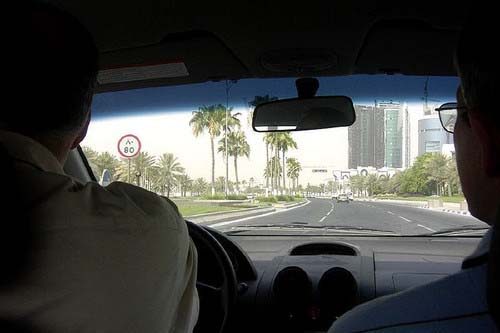
The government has announced a ban on new driver’s licenses for laborers, as part of its efforts to reduce congestion on Qatar’s overloaded road network.
The ruling has been introduced quickly, less than a month after a committee – made up of members from the Ministry of Interior, the Advisory Council, the Ministry of Municipal Affairs and Urban Planning and Ashghal – suggested the change.
From July 1st, driving schools in Qatar have not been allowed to register laborers wishing to learn to drive light and heavy vehicles, including machinery. They are, however, allowed to learn to drive motorbikes.
All laborers in government and private companies are covered by the rules, but those on personal sponsorship are exempt, a move designed to allow Qatari families to continue to employ private drivers.
Confusion
The new rules has been met with confusion and skepticism from some employers and driving schools, who have asked for the exact definition of “laborer,” and suggested that this group of drivers are only responsible for a very small percentage of traffic on Doha’s roads.
“Most of the labourers who come to us for registration are on personal sponsorship. They are not from companies or ministries,” Mohamed Zain Ibrahim, manager of Gulf Driving School, told Peninsula.
“Sometimes, a labourer is a graduate, and whether semi-skilled workers like electricians and technicians are to be treated as labourers. This is not clear.”
The Gulf Times reports that several driving schools have already approached the Traffic Department for clarification of exactly which type of worker the new rules apply to.
The paper also quotes an unnamed source in the Traffic Department, who explains the reasoning behind the decision:
“Commercial complexes employing 200-300 workers can transport the workers in buses, instead of each of them driving their own cars, thereby clogging the roads and occupying scarce parking lots,” he said.
“Another problem is that many of the low-income workers cannot afford to buy a new vehicle. Ultimately, some of them would go for old vehicles that have not passed the technical inspection and have no valid registration.”
The paper also quotes Qatari businessman Ahmed al-Khalaf, who suggests that the rules will lead to more illegal drivers on Doha’s roads, and fellow Qatari Abdulaziz al-Emadi, who argues that it would be better to introduce more mass transit options, and focus on more improvements to existing roads.
These new rules are a real move away from a decision two years ago to relax the requirement for expats to get a sponsor’s permission before obtaining a driver’s license.
A real solution?
The laborer license ban is only one improvement put forward by the government’s traffic task force.
They also suggested staggering work hours for government employees, shifting commercial activities to outside of Doha and building multi-level parking lots throughout the city.
They also identified some 138 vulnerable spots across Doha, including Ramada junction and the Corniche, where work is already underway to turn most of its roundabouts into intersections.
The government has introduced a number of measures in recent years to try to improve the situation, including a new theory test, and efforts to clamp down on corruption in driving schools.
Qatar is not the only country in the region grappling with a traffic problem. Kuwait has even more stringent license rules – only expats with a university degree who earn a minimum monthly salary of $1,400 are allowed to obtain driver’s licenses there, according to Arabian Business.
What do you think would make a real difference to Doha’s traffic woes? Thoughts?
Credit: Photo by Kireihana







